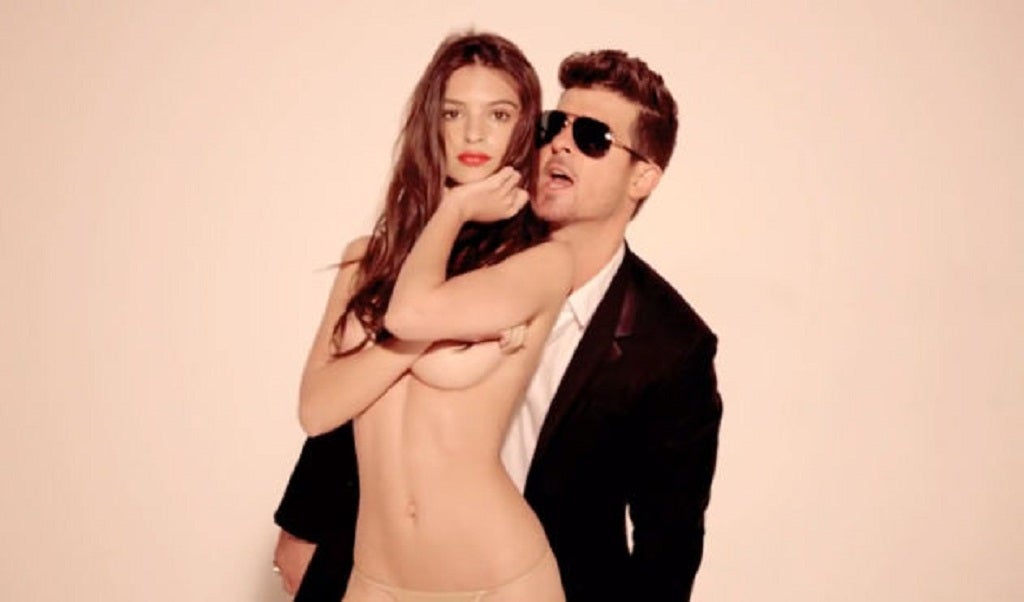They know they don't want it: More universities ban Robin Thicke's 'Blurred Lines'
Around 20 UK institutions have now banned the track for its sexist lyrics

Your support helps us to tell the story
From reproductive rights to climate change to Big Tech, The Independent is on the ground when the story is developing. Whether it's investigating the financials of Elon Musk's pro-Trump PAC or producing our latest documentary, 'The A Word', which shines a light on the American women fighting for reproductive rights, we know how important it is to parse out the facts from the messaging.
At such a critical moment in US history, we need reporters on the ground. Your donation allows us to keep sending journalists to speak to both sides of the story.
The Independent is trusted by Americans across the entire political spectrum. And unlike many other quality news outlets, we choose not to lock Americans out of our reporting and analysis with paywalls. We believe quality journalism should be available to everyone, paid for by those who can afford it.
Your support makes all the difference.Robin Thicke’s controversial chart-topper "Blurred Lines" has been banned in around 20 universities for its sexist lyrics and connotations of rape.
Student unions across the UK have stopped DJs from playing the US singer’s track, which hit number one in 14 countries last summer.
Leeds, Nottingham, Anglia Ruskin, Brighton, Birmingham and Kingston are among universities to have imposed a full ban recently, while several other institutions are contemplating following their lead.
The University College London Union and the University of London Union have also banned the song.
The University of Edinburgh was one of the first to shun the song as part of their ‘End Rape Culture and Lad Banter on Campus’ policy to shut down "myths and stereotypes around sexual violence" and safeguard female students.
Kirsty Haigh, vice president of Edinburgh’s Students’ Association said: “The decision to ban "Blurred Lines" from our venues has been taken as it promotes an unhealthy attitude towards sex and consent’.
Brunel has temporarily barred the song from its airwaves and Exeter students have voted for it to be criticised but not censored.
“A song that implies a woman is ‘an animal’ who ‘wants it’ because of the way she is dressed is not acceptable,” a statement from Exeter’s Students’ Guild read. “The language within the lyrics and the images within the promotional video are utterly degrading to the female subject. Any song that expresses an author’s frustration at ‘being sick of blurred lines’ is beyond unacceptable."
Coventry University has yet to impose a full ban but has confirmed it is taking all comments from students seriously.
Other universities to have banned the single include Derby, West Scotland, Chester, Brighton and Gloucestershire.
Thicke has defended "Blurred Lines", the video for which features topless women dancing around seductively as he sings "I’ll give you something big enough to tear your ass in two".
Believing his song to be acceptable as all male collaborators are “happily married with children”, Thicke has denied accusations of rape connotations, deeming them "ridiculous".
Speaking on The Today Show, the 36-year old explained that his song was intended “to stir conversation, to make us talk about what’s important and what the relationship between men and women is”.
“If you listen to the lyrics it says ‘That man is not your maker’ - it’s actually a feminist movement within itself,” he argued.
Feminist blog The Vagenda has slammed the video, branding it “an orgy of female objectification” while The Daily Beast’s Tricia Romano criticised the line ‘I know you want it’.
“Call me a cynic, but that phrase does not exactly encompass the notion of consent in sexual activity. Seriously, this song is disgusting - though admittedly very catchy,” she said.
Join our commenting forum
Join thought-provoking conversations, follow other Independent readers and see their replies
Comments